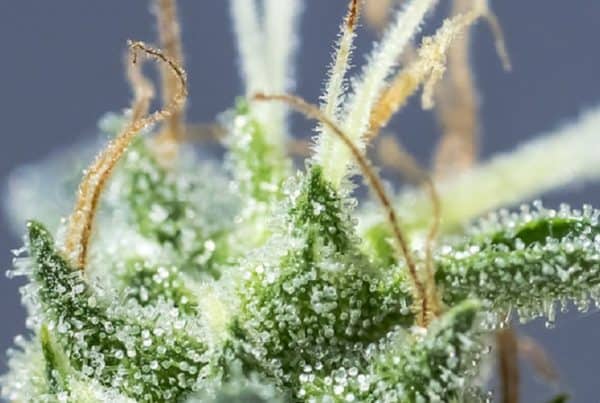TABLE OF CONTENTS
Carene’s sweet and earthy aroma adds to a cannabis strain’s complex flavor and aromatic profile. While it’s an uncommonly found terpene, research suggests it may have potential therapeutic effects on inflammation, bone health, chronic pain, fungal activity, and more.
Carene terpene is just one of the hundreds of terpenes found in the cannabis plant. With our comprehensive terpene guide, learn everything you want to know about carene, including its aroma, effects, and side effects.
What Is the Carene Terpene?
Delta-3 carene, also known as carene, is a bicyclic monoterpene, a class of terpenes that includes camphene, eucalyptol, borneol, and sabinene. Carene is usually associated with turpentine from conifers, which can reach concentrations of up to 42 percent.
In cannabis, carene is found in low concentrations of under 1 percent. Carene is known for its sweet, earthy, and pungent aroma. While rare in the cannabis plant, research indicates that carene may provide several health benefits.
Further research is needed into the health benefits of carene, but studies suggest that this terpene may improve overall bone health, relieve acute inflammation, treat fungal infections, and improve mental focus and memory retention.
Bicyclic monoterpenoids, a subclass of terpene molecules with two cyclical structures, including delta-3-carene. It has a sweet, strong smell and is clear and colorless.
While carene is present in some cannabis strains, it is also found in other plants.
Carene Terpene Aroma
Carene’s aroma is sweet, pungent, and earthy, with citrus, cypress, and pine undertones. Its smell reminds users of a damp forest. Carene’s musky and woody aroma is commonly used in food, cosmetic, and aromatherapy products.
Natural Sources of Carene

Most cannabis strains usually have a low carene content. Carene extracts are mainly derived from pine trees. The carene terpene naturally occurs in the following plants, trees, herbs, and fruits:
- Angelica root
- Pine trees
- Cedar trees
- Rosemary
- Basil
- Citrus
- Mango
- Cypress
- White pepper
- Fennel
- Kumquat
- Lime
Carene Terpene Effects and Health Benefits
Clinical research on carene’s medicinal efficacy on humans and health benefits is limited. Most studies on this terpene have been performed on animal or cell-culture models. Still, early research finds that carene has several potential benefits.
Carene’s effects vary between people. However, anecdotal reports suggest that carene may promote mental focus and memory retention, improve bone health, prevent fungal infections, and provide users with euphoric effects.
Anti-Inflammatory
In a 1989 study, researchers tested the anti-inflammatory properties of essential oils derived from the fruiting apex of Bupleurum gibraltaricum Lamarck. Essential oils were collected from the Cázulas mountains, Quéntar Reservoir, and Balcón de Canales in the Granada province.
All essential oils were mainly composed of delta-3 carene and alpha-pinene. Essential oil from the Cázulas mountains “was most active against acute inflammation owing to its high delta-3 carene content.”
Bone Health
In a 2007 study, researchers studied the effects of 89 natural compounds on bone repair and bone disease in mice. Researchers found that essential oils that contained carene stimulated mineralization (adding calcium to bones) in cell-culture and animal models. Carene may play an important role in bone metabolism, developing osteoporosis treatment, and maintaining healthy bones.
Antifungal
In a 2006 study, researchers evaluated the antifungal activity of different essential oils from juniper shrubs and trees (Juniperus oxycedrus ssp. oxycedrus, J. communis ssp. alpina, and J. turbinata). Essential oils from the J. oxycedrus ssp. oxycedrus had the most antifungal activity.
This oil had 65.5 percent alpha-pinene and 5.7 percent delta-3 carene. The results indicate that Juniperus essential oils may be used as therapeutic alternatives in antifungal treatment against dermatophyte strains. Dermatophytosis, also known as ringworm, is a contagious fungal infection affecting the skin or scalp.
Carene Side Effects
Most terpenes are “generally recognized as safe” (GRAS) by the Food and Drug Administration (FDA). However, studies have found that overexposure to carene may cause skin, eye, and lung irritation. Carene may play some part in the dry mouth and red eyes caused by cannabis.
Strains High in Carene
Most cannabis strains have a low concentration of delta-3 carene. However, higher-than-average levels have been found in the following cannabis strains:
- Super Silver Haze
- Jack Herer
- AK-47
- Arjan’s Ultra Haze #2
- Lemon Haze
- OG Kush
- Cherry Pie
- White Runtz
- Sunberry
- Dragon Fruit
There are many lesser-known terpenes that play important roles in the distinctive fragrances and potential medicinal effects of diverse plants, despite the fact that some, like limonene, myrcene, and linalool, frequently steal the show in the wide fragrant world of terpenes.
The distinct perfume of carene plays a part in the distinctive aroma of rosemary and fresh pine wood.
Even though research on carene is less developed than that on more well-known terpenes, there are some potential advantages and outcomes of this substance:
Bone Health: Early research suggests that carene may promote bone growth or healing. This might make it advantageous for ailments like osteoporosis or arthritis, though more thorough research is required to support these claims.
Carene may have anti-inflammatory properties, which may be helpful in treating diseases that are characterized by inflammation.
Effects on Drying: According to anecdotal evidence, carene is to blame for certain cannabis users' dry lips and eyes. Thought to lower body fluids, this effect needs more research to be confirmed.
Other Terpenes and Compound Interactions
The potential for synergistic interactions between terpenes and other chemicals is one of their interesting features.
Carene is believed to, like other terpenes, operate in concert with cannabinoids and other terpenes in the cannabis plant to produce the “entourage effect,” which amplifies or modifies the overall effects of the plant. However, precise interactions involving carene are still being investigated.
“
There are over 300,000 jobs in the cannabis industry. CTU trained me for one of them!

Makes $24.50 @ THC +
Conclusion on Carene
Like many other terpenes, carene is just one small component of the enormous mosaic of chemicals that together give plants their diverse range of aromas, fragrances, and possible therapeutic effects.
It's possible that as the scientific community continues to explore deeper into the world of terpenes, we'll learn more about the special functions and advantages of substances like carene.
Become a Master of Cannabis with CTU
Interested in learning more about how cannabis works in the human body? Want to learn how to use cannabis to treat your inflammation, pain, anxiety, nausea, or other medical condition? CTU’s online-based education can help you uncover the power of cannabis.
Learn how cannabis compounds can produce a wide range of therapeutic benefits. Carene is just one of many terpene and compounds found in the cannabis plant. Enroll in CTU’s Master of Cannabis Certification Program to get a complete cannabis education today!

Fred Hernandez
Fred Hernandez is a highly accomplished and versatile writer, boasting an extensive background in the cannabis industry. With an in-depth understanding of various sectors including cultivators, processors, retailers, and brands, Fred's expertise spans across the entire cannabis landscape. As a prominent contributor to CTU, he consistently delivers insightful articles exploring the latest developments, news, and regulations shaping the cannabis industry. Whether it's delving into the intricacies of cannabis products, cannabis strain reviews, or providing comprehensive analyses of cannabis laws, or sharing expert insights on cannabis cultivation techniques, Fred's wealth of knowledge positions him as an invaluable writer and educator for all cannabis-related subjects.












 Jeff was involved in an accident where he endured a traumatic brain injury. He had a week-long stay in ICU where brain surgeons
Jeff was involved in an accident where he endured a traumatic brain injury. He had a week-long stay in ICU where brain surgeons  100% risk free money back guarantee within 48 hours after purchase if student has not completed any of the courses or exams.
100% risk free money back guarantee within 48 hours after purchase if student has not completed any of the courses or exams.